Rise and Shine
Brief Synopsis
Cast & Crew
Allan Dwan
Jack Oakie
George Murphy
Linda Darnell
Walter Brennan
Milton Berle
Photos & Videos
Film Details
Technical Specs

Synopsis
"Boley" Bolenciecwicz is the star player of the Clayton College football team, and concern that Boley will fail his classes because of his lack of sleep and study prompts the school's president to install Boley in the home of Professor Philip Murray, a quiet man who is an amateur magician. Boley is pleased with the situation, as he has a crush on Murray's daughter Louise, one of the team's cheerleaders. While Boley is settling in, New York City racketeer "Menance" decides to bet heavily on Clayton throughout the season and needs someone to keep an eye on Boley. Menance chooses nightclub entertainer Jimmy M'Gonigle, who was an All-American for Yale several years earlier, and two of his partners, Colonel and Mame Bacon. The Bacons and Jimmy soon make the acquaintance of Boley and the Murray family, which includes Grandpa, an eccentric whose belief that the Civil War is still raging does not interfere with his pursuit of women. Louise and Jimmy begin a romance, although Jimmy is jealous of the time Louise must spend with Boley when she tutors him or sings him to sleep. When the football season begins, Boley leads Clayton to victory in every game, until there is only one game remaining, against football powerhouse Notre Dame. With his fellow students' encouragement, Boley passes his midterms and qualifies to play, but Menance decides to bet against him. Knowing that Jimmy is too honest to interfere with Boley, Menance sends his main henchman, Seabiscuit, who is so full of nervous energy that he neighs like a horse, to Clayton. Seabiscuit tries to get Jimmy to return to New York, but Jimmy states that he is in love with Louise and wants to settle in Clayton. He changes his mind, however, when he sees Louise in Boley's bedroom and mistakenly assumes the worst. Louise, who was merely singing Boley to sleep, does not understand Jimmy's sudden coldness. Meanwhile, the colonel and Seabiscuit attempt to steal Grandpa's treasure chest, which they do not know is full of Confederate money, and when their plan is botched, Jimmy forces Seabiscuit to reveal the real reason behind Menance's plan to have Jimmy return to New York. Jimmy makes up with Louise and vows to protect Boley from Menance, but when Menance arrives in Clayton with two of his men, Butch and Gogo, they succeed in kidnapping Boley the night before the big game. The morning of the game, Jimmy and Grandpa discover that Boley is missing but find him at Menance's hideout. With Seabiscuit's help, Jimmy and Grandpa rush Boley to the stadium, where Clayton is behind in the last quarter. Jimmy then plays on Boley's phobia that the nearby Clayton dam will break, and the sleepy athelete runs to the winning touchdown.

Director
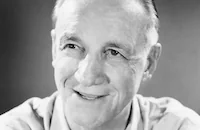
Allan Dwan
Cast

Jack Oakie

George Murphy

Linda Darnell
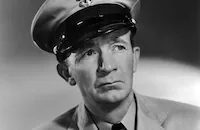
Walter Brennan

Milton Berle

Sheldon Leonard
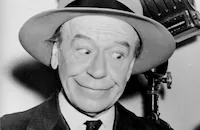
Donald Meek
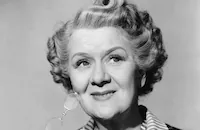
Ruth Donnelly

Raymond Walburn

Donald Macbride
Emma Dunn
Charles Waldron
Mildred Gover
William Haade
Dick Rich
John Hiestand
Claire Dubrey
Francis Pierlot

Paul Harvey
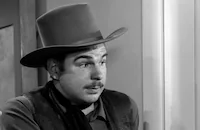
Matt Willis
Pat Flaherty
Edward Arnold Jr.
Billy Wayne
Jimmy Butler
Robert Shaw
Mike Pecarovich
Robert Homans
Tim Ryan

Nestor Paiva
Jack Jackson
Perk Lazelle
Dick Reed
Bud Mercer
Crew
Bernard Carr
Edward Cronjager
Richard Day
George Dudley
Buddy Erickson
Herbert Farjeon
Mark Hellinger
Roger Heman
William Koenig
George Leverett
Thomas Little
Nick Lukats
Herman J. Mankiewicz
Allen Mcneil
Robert C. Mcneish
Emil Newman
Arch Oboler
Hermes Pan
Guy Pearce
Ralph Rainger
Leo Robin
Aaron Rosenberg
Mal St. Clair
Gwen Wakeling
Darryl F. Zanuck

Photo Collections
Film Details
Technical Specs

Articles
Rise and Shine (1941)
The film opens with a rousing musical number (all songs are written by Leo Robin and Ralph Rainger), "Hail to Bolenciecwicz," featuring a bevy of overly-glamorous cheerleaders marching in step and acting much more like a Broadway chorus line rather than college cheerleaders. The big finish has them spell out the subject of their song in held-up placards, although it comes out as COWEBINCCEZL! The girls, led by Louise Murray (Linda Darnell), are all atwitter because star football prospect "Boley" Bolenciecwicz (Jack Oakie) is due to arrive at Clayton College, which is in dire need of a boost to their sports program. The problem is that the Conference Investigating Committee threatens to declare Boley ineligible to play the first time he fails to pass an exam, and Boley needs a LOT of help with studies, as he is stupid. The college president (Charles Waldron) persuades economics professor Philip Murray (Donald Meek) to board Boley in his house; Boley is more than willing when he meets the professor's pretty daughter Louise. The Murray household is full of eccentrics; for example, the professor is an amateur magician constantly pulling eggs out of his mouth while Grandpa (Walter Brennan) is an irascible skirt-chaser and Civil War veteran. Complications arrive in the form of Jimmy McGonagle (George Murphy), a genial nightclub singer sent by big-city gangster Menace (Sheldon Leonard) to move in next door to the Murrays and spy on Boley. Menace bets a lot of dough every year on football, but he only loses when he doesn't have the "inside dope." As insurance, Menace also sends along an older couple, Colonel Bacon (Raymond Walburn) and Mame (Ruth Donnelly) and later, his horse-mouthed henchman, Seabiscuit (Milton Berle). Inevitably, romance sprouts as Jimmy falls for Louise and Grandpa courts Mame.
Rise and Shine is crammed with songs and incident, colorful characters and constant gags - both physical and verbal. It never gets out-of-hand thanks to referee work by veteran director Allan Dwan, a former football player himself. Screenwriter Mankiewicz seems to realize that he is dealing with clichéd character types and he makes the most of it; all situations are played with a knowing wink - a tone that in later decades would be called "camp" - and no scene overstays its welcome. Choreographer Hermes Pan staged the musical sequences, and they display an intentionally reckless attitude towards logic. One scene has romantic leads Darnell and Murphy enjoying a bicycle ride with a song; here the approach to the material deviates from the norm -- the artificiality of the scene is emphasized as the pair ride mocked-up bicycles in front of a rear projection screen and perform some outlandish moves to the music.
Linda Darnell was just seventeen years old when Rise and Shine was filmed. She had been frustrated for months following the success of Blood and Sand (1941), and the contract player was being paid her salary of $750 a week to take studio-mandated lessons in acting, singing, dancing and posture, but was being passed over for important roles she felt she could tackle. According to biographer Ronald L. Davis, writing in Hollywood Beauty: Linda Darnell and the American Dream (1991, University of Oklahoma Press), in Rise and Shine "...Linda's was anything but a demanding role. Still, for the first time, she played someone her own age and even sang a few bars, which the sound department dubbed." The day before Rise and Shine wrapped shooting, Darnell turned eighteen and the cast and crew celebrated her birthday - an important one for a film actor because it meant no more teachers and welfare workers on the set, and longer working hours with fellow actors.
Rise and Shine opened in New York on Friday, December 5th, two days before the bombing of Pearl Harbor. In the New York Times review appearing on the 6th, Bosley Crowther noted that Fox was late with its annual football picture, "...but better be late than never with this harum-scarum jape, for it packs some brisk entertainment in a madly farcical vein..." Crowther felt that screenwriter Mankiewicz "borrowed freely" from sources other than the Thurber story, including the 1932 Fox comedy Rackety Rax, a satire of a collegiate football program set up by gangsters; the Kaufman and Hart play You Can't Take It with You; and "any number of football films." Nevertheless, he felt that the final product was "...as impromptu as a pick-up game, yet most of its little incidents are lively and chucklesome." The critic for Time magazine noted that Jack Oakie had not made a football picture since his nearly-decade-old comedies at Paramount Pictures, and "now a tubby 38, Oakie turns out to be the back-of-the-year at his new alma mater. Well-cast as a dumb, sleepy, semi-inhibited sophomore named Bradislaus ("Boley") Bolenciecwicz, Oakie mugs Clayton College to a national championship in a wacky welter of song and dance, romance and slapstick." This writer also notes the similarities in plot to the Kaufman-Hart play and the McLaglen film, "...but it has enough good farce to make it go - especially Walter Brennan's portrayal of a glandular octogenarian with a propensity for showing his Civil War etchings to willing blondes."
Producer: Mark Hellinger
Director: Allan Dwan
Screenplay: Herman J. Mankiewicz (screenplay); James Thurber (story)
Cinematography: Edward Cronjager
Art Direction: Richard Day, George Dudley
Music: David Buttolph, Cyril J. Mockridge, Alfred Newman (all uncredited)
Choreography: Hermes Pan
Film Editing: Allen McNeil
Cast: Jack Oakie (Boley Bolenciecwicz), George Murphy (Jimmy McGonagle), Linda Darnell (Louise Murray), Walter Brennan (Grandpa), Milton Berle (Seabiscuit), Sheldon Leonard (Menace), Donald Meek (Professor Philip Murray), Ruth Donnelly (Mame Bacon), Raymond Walburn (Colonel Bacon), Donald MacBride (Coach Graham)
BW-92m.
by John M. Miller

Rise and Shine (1941)
Quotes
Trivia
Notes
This film marked the first time that one of author James Thurber's works was adapted for motion pictures. My Life and Hard Times is composed of autobiographical sketches in which Thurber describes his life in a small Ohio town, his eccentric family and a football player named Bolenciecwicz. According to the Twentieth Century-Fox Produced Scripts Collection at the UCLA Arts-Special Collections Library, author James Thurber submitted a film treatment of My Life and Hard Times to the studio in the spring of 1941, but was unable to continue further work on it due to his failing eyesight. Hollywood Reporter news items noted that Lamar Trotti had been assigned to work on the script of this picture, but his contribution to the completed film has not been confirmed.
In an August 1941 story conference, studio production executive Darryl F. Zanuck suggested casting either Broderick Crawford, Wayne Morris or Jack Carson as "Boley," and Allen Jenkins as "Seabiscuit." A September 1941 Hollywood Reporter news item listed the following actresses, who were to have roles in the film and then participate in the picture's exploitation: Roseanne Murray, Marion Rosamond, Vivian Mason, Barbara Lynn, Verna Knopf, Claire James, Violet Church, Virginia Maples, Edna May Jones and Mary Scott. Their appearance in the completed picture has not been confirmed, however. According to another September 1941 Hollywood Reporter news item, Leo Robin and Ralph Rainger also wrote the songs ""It All Depends on Thee" and "Dance It Off" for the picture, but they were not included in the released film.
Walter Brennan was borrowed from Samuel Goldwyn for the film, while George Murphy was borrowed from M-G-M. According to Hollywood Reporter news items, technical advisor Robert C. McNeish was the assistant football coach at the University of Southern California, and Nick Lukats, who instructed Jack Oakie in tackling, was a former Notre Dame All-American. Second unit director Mal St. Clair shot football scenes on location at the USC campus and the Los Angeles Memorial Coliseum, and also shot some footage near Chino, CA. According to information in the file on the film in the MPAA/PCA Collection at the AMPAS Library, the Hays Office warned the studio: "At no time should magical tricks be exposed, since any exposure would involve your company in trouble with the American Society of Magicians." Rise and Shine was the first film produced by Mark Hellinger for Twentieth Century-Fox.














